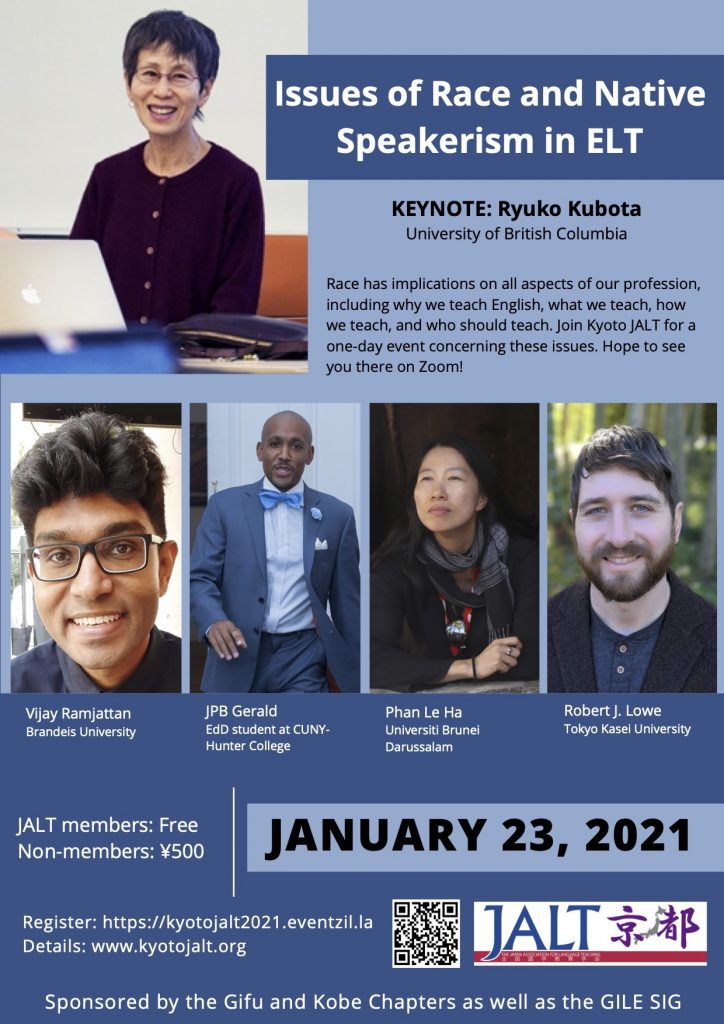Issues of Race and Native Speakerism in ELT January 23, 2021 event – UPDATED

Ryuko Kubota – Keynote Speaker
University of British Columbia
Critical Approaches to Race, Racism and Antiracism in English Language Teaching. Issues of race, which are linked to native speakerism, have long constituted a hidden reality in English language teaching. This presentation exposes the concepts of race, racism, and antiracism and explore their complexities and interlocking relationships with language and other identity categories. I argue that educational practices for justice and anti-oppression necessitate explicit, collective, strategic, and hyper-reflexive engagement in race, racism, and antiracism.
JPB Gerald
EdD Student at The City University of New York – Hunter College
Worth the Risk: Decent(e)ring Whiteness in English Language Teaching
This is a discussion focused on Gerald’s recently published article in the BC TEAL journal and its implications for the field of language education. It begins with a short presentation on important terminology regarding racism and whiteness, moves into the arguments about how to decenter whiteness in the field of language teaching, and will be followed by a question and answer session.
Robert J. Lowe
Tokyo Kasei University
The “Native Speaker” Frame in English Language Teaching
This talk introduces the concept of the ‘native speaker’ frame in ELT – a perceptual filter of Western ‘native’-normativity through which ELT professionals interpret their experiences and justify their practices. While overt consequences of native-speakerism such as hiring discrimination are becoming more widely recognized in ELT, those effects which are less obvious (such as beliefs around educational technology and student cultural deficiency) often go unrecognized. After a brief discussion of frames and framing, a definition will be given of the ‘native speaker’ frame, followed by examples of the frame in operation. The talk will highlight how subtle discourses of superiority and inferiority can still exist, even in cases where surface-level equality has
been achieved.
Vijay Ramjattan
Brandeis University
Raciolinguistic Enregisterment and Aesthetic Labour in ELT
Due to the colonial spread of the English language, embodied whiteness and “nativeness” in English are deeply intertwined. Indeed, through the process of raciolinguistic enregisterment where people come to “look like languages” (Rosa, 2019), native English speakers are often imagined to be white. This has implications for ELT, which rewards workers who possess a particular look and sound. Specifically, ELT is a type of aesthetic labour in which looking good for the job entails being white while sounding right means having a native speaker accent. The purpose of this presentation is to explore the consequences of this racialized aesthetic labour. First, it leads to racist hiring practices that disadvantage racially minoritized teachers. Moreover, it furthers the deskilling of the ELT profession by emphasizing embodied traits as “credentials.” The presentation concludes by outlining possible tactics to disrupt conceptions of the white native speaker of English as the ideal worker in ELT.
Phan Le Ha
Universiti Brunei Darussalam
“ Aren’t We All Complicit? ”: Multiple Faces of Race and Language in ELT
This talk invites the audience to critically engage with complex issues and questions surrounding the increasing transnational mobility of English language teachers. It offers multi-layered discussion of transnational teacher mobility, whereby race, religion, skin colour, nationality, language, work politics, and scholarly and professional perspectives all come together in nuanced ways that invite rigourous examination. As teachers move across borders, they bring with them certain identities and worldviews, knowledge, ideas, pedagogies and other socio-cultural and linguistic resources and prejudices. At the same time, they constantly respond to varied, even contradicting, demands, needs, expectations and judgements of students, peers, institutions, and the ELT profession. While all these are happening, pains, gains, and uncertainties experienced by many teachers are often sidelined. I shall discuss in-depth accounts from teachers of diverse backgrounds who have taught English in Asian and Gulf countries. Through these accounts, I show that many deep-rooted perceptions and discourses associated with native speakers of English (i.e. Westerners, the idea of the West and Westerners), race (including White, Black), ethnicity (for example, South Asian) and religion (for instance, Islam) continue to travel, invade different professional TESOL/ELT spaces and haunt teachers themselves. Many TESOL/ELT professionals remain trapped in these perceptions and discourses, as victims, offenders, both, or somewhere in between. After all, aren’t we all complicit?
Schedule
8:50 Zoom room opens
9:00 AM Vijay Ramjattan
10:10 AM JPB Gerald
11:20 AM Ryuko Kubota
12:30 PM Lunch/Break
1:00 PM Robert Lowe
2:10 PM Phan Le Ha
3:10 PM Closing/announcements

